|
|
|
Sort Order |
|
|
|
Items / Page
|
|
|
|
|
|
|
| Srl | Item |
| 1 |
ID:
167452
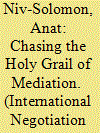

|
|
|
|
|
| Summary/Abstract |
President Clinton was deeply engaged and invested in the Israeli-Palestinian peace process, and this commitment seems to transcend administrations as Presidents Bush, Obama, and more recently Trump have made considerable efforts to mediate the Palestinian-Israeli conflict. This article addresses the question of why would a US president risk his own legacy and the reputation of the office as an international mediator to try to solve this complicated case in the face of expected and proven failures? This study traces efforts made by recent US Presidents to mediate the long-standing protracted conflict between Palestinians and Israel understand the reasons for the ongoing US commitment to this process, and why different presidents and their administrations persist in their mediation attempts where their predecessors failed.
|
|
|
|
|
|
|
|
|
|
|
|
|
|
|
|
| 2 |
ID:
167454
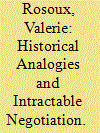

|
|
|
|
|
| Summary/Abstract |
This article questions the role of historical analogies in reaching – or not – effective and durable agreements. It compares two emblematic cases, the Israeli-Palestinian case and the Franco-Algerian case, and focuses on the tension that exists between the weight of the past and the need to move forward. The purpose of the article is not to reduce the hardest cases to their historical dimension. It is rather to show that the ways in which the memories of past events are interpreted, misinterpreted, or even manipulated create the context that shapes peace processes. The analysis is structured on the three main functions attributed to historical analogies: representing the unfamiliar, assigning social roles, and framing action. The examination of these functions helps us to better understand how negotiators and mediators can try to live with the memories rather than without them or against them.
|
|
|
|
|
|
|
|
|
|
|
|
|
|
|
|
| 3 |
ID:
167455
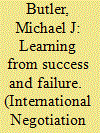

|
|
|
|
|
| Summary/Abstract |
The various contributions to this special issue reveal three overarching insights with respect to negotiation and mediation in the hard(est) cases: one, the discrepancy between securing negotiated or mediated agreements and actual solutions; two, the conditioning effects of structural and contextual considerations on the bargaining process; and three, the divergent ends to which negotiation and mediation can be (and are) directed. Ultimately, the preceding analyses suggest that, when it comes to the hard(est) cases, negotiation and mediation are best thought of as tools within a larger toolkit, which have a markedly better chance of succeeding when they are employed in an environment amenable to them. On their own, negotiation and mediation cannot be effective in cultivating ripeness in such cases. Rather, the challenge at hand is to employ other means to transform the context enveloping the bargaining environment in ways that are conducive to negotiated and mediated solutions.
|
|
|
|
|
|
|
|
|
|
|
|
|
|
|
|
| 4 |
ID:
167453
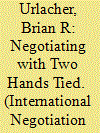

|
|
|
|
|
| Summary/Abstract |
Theories of conflict resolution often posit unified actors as a simplifying assumption. In practice conflict actors often struggle to balance competing factions and centers of power. Schelling and Putnam have argued that factors that constrain what a negotiator can accept are a potential source of leverage in a bargaining process, yet a counter argument suggests that leaders seeking to negotiate, while facing divided government, may be less able to credibly signal their intentions. Drawing on event data from nearly 3,000 conflict-months, this paper analyzes the frequency of concessions offered by both rebels and governments. This study finds evidence that a fractured decision-process results in both rebels and governments making more concessions. Further corroboration is provided through a case study of the Philippine government’s efforts to negotiate an end to the conflict in the Mindanao region.
|
|
|
|
|
|
|
|
|
|
|
|
|
|
|
|
| 5 |
ID:
167449


|
|
|
|
|
| Summary/Abstract |
In seeking a fuller understanding of the provision and effectiveness of negotiation and mediation, salient lessons can be gleaned from instances in which these processes seem unlikely to succeed or unlikely to be tried at all. Contributions to this special issue of International Negotiation purposefully avoid mining examples of success stories for correlates. The contributors have instead consciously identified and examined applications of negotiation and mediation in the hard(est) cases, with the objective of teasing out what shortcomings and even failures can tell us about the prospects of negotiation and mediation as practices of conflict management and resolution. Using the criteria discussed in this introductory article, this collection examines negotiation and mediation in international crises, intractable conflicts, civil wars, and other cases defined by complex contextual environments, actor configurations, and disputes – with the goal of revealing insights that can improve the effectiveness of negotiation and mediation in application.
|
|
|
|
|
|
|
|
|
|
|
|
|
|
|
|
| 6 |
ID:
167451
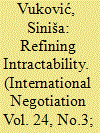

|
|
|
|
|
| Summary/Abstract |
Intractability is generally associated with prolonged tensions, employment of destructive means, suspicion and mistrust, inflammatory rhetoric and polarized solutions that are usually presented as ultimatums. Existing studies on intractability have emphasized the resistance to solution as a crucial indicator of intractability, and subsequently explored the phases through which intractability evolves and key characteristics these conflicts possess. What is largely missing is a nuanced explanation of at what point resistance turns into intractability. Building on earlier studies from social-psychology on entrapment in negotiations this article will develop a novel conceptual framework of entrapment as a precondition to intractability, and apply it to assess the causes and consequences of entrapment in an escalating conflict using the Syrian Civil War as a case study. The study will demonstrate that resistance to solution, which is a consequence of entrapment, does not automatically lead to intractability.
|
|
|
|
|
|
|
|
|
|
|
|
|
|
|
|
| 7 |
ID:
167450
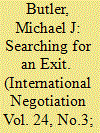

|
|
|
|
|
| Summary/Abstract |
By virtue of their defining criteria, international crises would seem unlikely candidates for conflict management and resolution. However, negotiations among crisis protagonists are not uncommon. Such behavior may reflect a desire to ‘exit’ the crisis dynamic. This article takes up the question of when and in what circumstances actors engaged in crisis situations turn to negotiation. Through an empirical analysis of over 1000 cases of foreign policy crises occurring between 1918 and 2015, this research examines a set of potential contextual, processual and structural correlates of crisis negotiation. The results of this analysis indicate that negotiation is less likely to occur in complex, high stakes, and especially violent crises, suggesting that negotiation is an unlikely and perhaps ill-suited response to more intense and severe crises.
|
|
|
|
|
|
|
|
|
|
|
|
|
|
|
|
|
|
|
|
|